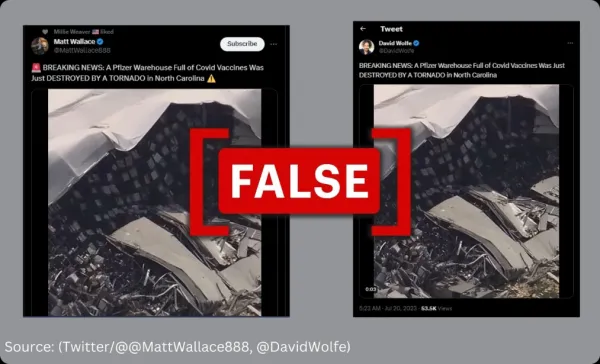By: Ankita Kulkarni
July 21 2023

Pfizer told Logically Facts that their site in Rocky Mount has never produced or stored COVID-19 vaccines at the plant.
Context
A tornado in North Carolina has severely damaged a Pfizer plant in Rocky Mount. Associated Press (AP) News reported that parts of the roofs were ripped off, and around 50,000 pallets of medicine were damaged in the destruction, according to Nash County Sheriff Keith Stone. However, the company later issued a statement noting that all the employees were safely evacuated and no significant injuries were reported from the plant site. The National Weather Service added that "damage was consistent with an EF3 tornado with wind speeds up to 150 mph."
Following this, a post circulating on Twitter shows a 10-second video of scenes from the damaged plant and claims that it was "full" of COVID-19 vaccines that got destroyed. The caption reads, "BREAKING NEWS: A Pfizer Warehouse Full of Covid Vaccines Was Just DESTROYED BY A TORNADO in North Carolina." The post has garnered 11.8 million views and has been widely shared by other users with similar claims.
However, these claims are false.
In Fact
We found that the Pfizer plant in Rocky Mount does not house COVID-19 vaccines. Pfizer's website detailing the plant noted that the Rocky Mount site is one of the largest sterile injectable facilities in the world that produces a wide range of products. These include anesthesia, analgesics, therapeutics, anti-infectives, and neuromuscular blockers, which are available in ampules, vials, syringes, IV bags, and semi-rigid bottles.
We conducted research on which Pfizer plants manufacture COVID-19 vaccines and found on its website that, after the Pfizer and BioNTech vaccine was approved, two facilities were selected for manufacturing vaccines in two locations — Puurs in Belgium, and Kalamazoo in Michigan, U.S. Further, we found the list of all the Pfizer manufacturing sites in the U.S. also noted that only the Kalamazoo site in Michigan produces COVID-19 vaccines, while others are manufacturing other Pfizer products.
We checked on the website how the COVID-19 vaccines were distributed from their designated plant. A section titled "Manufacturing and Distributing the COVID-19 Vaccine" notes that vaccines are primarily shipped from Kalamazoo and Puurs sites directly to the point of use (POU). It added that their system also uses existing distribution centers in Pleasant Prairie, WI, and in Karlsruhe, Germany, for the COVID-19 vaccine distribution.
It states that distribution centers have a dedicated area for storing product that is not going directly from Kalamazoo or Puurs sites to POU. The vaccines are being transported through roads or airways directly from Pfizer sites POU within a day or two in the U.S. and three days globally.
This rules out the possibility that vaccines were being stored for distribution as they are transported directly from the production site to the point of use.
Logically Facts also contacted Pfizer for clarification. Director of Global Media Relations Steve Danehy confirmed, “Our Pfizer Rocky Mount site has nothing to do with the COVID-19 vaccine. Rocky Mount has never produced nor stored the COVID-19 vaccine.”
The Verdict
The damaged Pfizer plant in North Carolina did not house COVID-19 vaccines. The site manufactures sterile injectables for anesthesia and other therapeutics. Social media posts have incorrectly claimed that the warehouse was full of COVID-19 vaccines. Therefore, we have marked the claim as false.